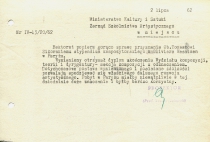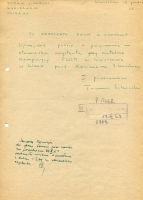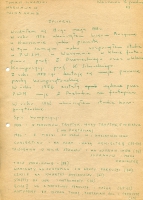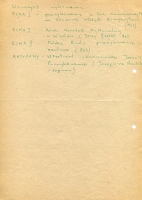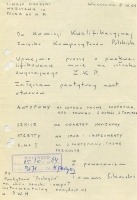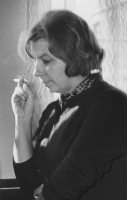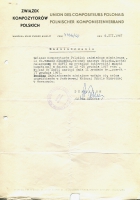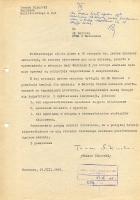We could say that Tomasz Sikorski’s career as a mature composer began in 1962, when, shortly before graduation, his Echoes II won a prize at the 5th Young Composers’ Competition. It was a work for five performers and not, as was officially announced (and published by the Życie Warszawy daily), for symphony orchestra. Echoes II (quasi improvvisazione) for 1, 2, 3 or 4 pianos, tape and percussion was premiered a year and a half later (in January 1964). It is difficult to say whether it was the success of the first version that made the composer continue to work on the piece and add the tape part, or whether he had thought about enriching the composition even earlier.
In 1962 Sikorski also made his debut as a pianist at the Warsaw Autumn Festival, performing (with the German mezzo-soprano Carla Henius and Zygmunt Krauze) Dieter Schönbach’s Lyrische Gesange II, presented for the first time in Poland. In summer that year a chance came up for Sikorski to go to Paris on a scholarship to study with Olivier Messiaen. Teodor Zalewski, Deputy Rector of the State School of Music, wrote a letter to the Ministry of Culture and Art supporting him. The scholarship was not granted in the end – most likely because of the composer’s young age and his modest oeuvre. Less than two years later – in February 1964 – Tomasz Sikorski once again applied for that scholarship, but this time, too, his efforts were in vain. However, those failures had little if any impact on his budding career.
The concerts were very frequent until 1965, when John Tilbury returned to England. In the same year Tomasz Sikorski and Zbigniew Rudziński went to Paris on a scholarship for six months. The work of ‘Warsztat Muzyczny’ was, in fact, suspended. After returning from Paris the young composers – now without John Tilbury – were less involved in organisational matters. They focused more on their own compositions and academic work (both lectured at the State School of Music in Warsaw). The idea of ‘Warsztat Muzyczny’ was continued by Zygmunt Krauze, who in 1967 founded his own ensemble under that name. Its line-up was as follows: Edward Borowiak – trombone, Witold Gałązka – cello, Zygmunt Krauze – piano, Czesław Pałkowski – clarinet. For over 25 years the ensemble gave hundreds of concerts and premiered many works dedicated to it. Sikorski and Rudziński, slightly surprised by this turn of events, founded their own ensemble, ‘Ad Novum’, in late 1967. It existed until the mid-1970s. Its line-up included, in addition to the founders, the flautist Andrzej Wojakowski and the percussionist K. Woźniak. The line-up was changed as necessary, often expanding even to more than ten musicians. ‘Ad Novum’ premiered compositions by e.g. Edison Denisov, Zbigniew Bujarski, Jan Wincenty Hawel as well as by its founders.
On 30 September 1965, the final concert of the Warsaw Autumn Festival featured the premieres of Zbigniew Rudziński’s and Tomasz Sikorski’s latest works. The following morning the composers were to formally begin their French scholarships. The first piece was Rudziński’s Moments Musicaux for symphony orchestra. It was followed by Sikorski’s Concerto Breve for piano, wind instruments and percussion, with the composer himself brilliantly playing the piano part.
Sikorski did not leave for Paris until 4 October. The two composers stayed in spacious studio flats near the Seine, at Rue de l'Hôtel de Ville 18, which houses the Cité Internationale des Arts to this day. Officially, they were studying with Nadia Boulanger, but they met her sporadically and their visits were more of courtesy calls. They would exchange views on music and have casual conversations. The young artists really appreciated these inspiring discussions, but decided that traditional lessons of sheet music reading or of harmony, suggested by Boulanger, were of little use to them. During those visits they had an opportunity to meet many eminent figures: Pierre Boulez, Marc Chagall, Witold Małcużyński, Olivier Messiaen and Iannis Xenakis. They expanded their musical horizons, often taking part in various concerts, e.g. of the influential concert society ‘La Domaine Musical’. In addition, they could present their own oeuvre during events organised especially for the purpose. Just over a month after their arrival in Paris – on 10 November – Sikorski’s Concerto Breve and Prologues as well as Rudziński’s Contra Fidem and Moments Musicaux were played in public.
The time spent on the scholarship was also a period of intense work. Excellent living conditions as well as distance from current affairs were conducive to focusing on composition. In late February 1966, in a letter to Leonia Piwkowska and Alina Sawicka, Tomasz Sikorski wrote:
I redoubled my efforts as soon as I learned about the ISCM [this was about a performance of Sikorski’s work during the festival organised by the ISCM (International Society for Contemporary Music) in Stockholm in 1966]. This is really encouraging. I have finished a piece for flute and piano [Monodia e Sequenza], I’m putting finishing touches to a piece for orchestra [Sequeza I ], which I’ve submitted for the Festival [Warsaw Autumn Festival], and now I’m writing a piece for piano [most probably Sonant]. Time is running out – one has to sprint to the finish.
After returning from Paris, in early April 1966, the composer moved to a new flat in the Żoliborz district (ul. Kozietulskiego 6). He must have felt that his financial situation is stable enough for him to be able to pay the rent. He may have also needed more space to work and feel independent. Since October the previous year he had worked as senior assistant lecturer at Faculty I, a post he would hold for three years. He could, therefore, make plans for the future. Immediately after his return Sikorski threw himself into the whirl of preparations of the Warsaw Autumn Festival. He began working for the Festival Repertoire Committee chaired at that time by Kazimierz Serocki. Pressure of work prompted him to submit an application for unpaid leave until the end of the academic year.
The following years were typical for the young composer: travelling, performing, composing, preparing scores for publication. Even before the premiere of Sequenza I at the 1966 Warsaw Autumn Sikorski went to London. The first half of 1967 was marked by trips to Helsinki for the ‘Ung Nordisk Musik’ (‘Young Nordic Music’) Festival, to London for a recording of Sonant for the BBC Radio, and to Denmark and Federal Republic of Germany for concerts and recordings. At the Warsaw Autumn Festival Sikorski performed his Sonant for the first time in Poland, and on 2 October the audience in Los Angeles heard his Echoes II (quasi improvvisazione). In December he was delegated as a member of the Warsaw Autumn Repertoire Committee to attend a festival of Bulgarian chamber music in Sofia.
In 1968 Sikorski continued his work in the Warsaw Autumn Repertoire Committee (he remained its member until 1974). In late April he participated in the Congress of Young Composers and Musicologists from Socialist Countries in Eger, Hungary. Rather unexpected news reached him in August – he learned that his employment contract with the State School of Music in Warsaw would not be extended. The infringements of senior assistant lecturer Sikorski included, according to his superiors, ‘absence without leave from classes’, ‘absence from tests and exams’ and, more generally, ‘failure to fulfil his official duties’. In replying to these charges, Sikorski wrote:
Confirming the receipt of the letter of 19 August, I am compelled to say that the accusations against me presented in the minutes of the meeting of the Board of Faculty I (during which my case was discussed) are totally groundless and untrue.
However, a lot suggests that the composer did have considerable problems with adapting to the mode of working at the School. Sometimes, engrossed in his work, he would lock himself in a lecture room and did not let his students in. Unlike his father, he was not a talented teacher; teaching was not an activity that he found engaging.
As long as Kazimierz Sikorski was Rector, Tomasz got away with many of his ‘peccadilloes’, but when the protective umbrella disappeared, he had to bear the consequences of his conduct.
It was Tomasz Sikorski’s first serious failure in life, perhaps even constituting a turning point in his hitherto successful career. It must have been a great shock to him, leaving a serious grudge. Such an unfavourable turn of events made Sikorski aggressive. He must have appealed and written various official letters, but either he did not receive a reply or the reply came too late, or it was not to his liking. On 18 November, in a fit of rage, Sikorski sent a telegram to the Rector of the State School of Music, Teodor Zalewski:
I KINDLY ASK YOU SIR IF YOU ARE FAMILIAR WITH THE CUSTOM OF REPLYING TO LETTERS = TOMASZ SIKORSKI.
Tomasz Sikorski never returned to his academic career.
When he left the School for good, he continued in his other jobs: programming of the Warsaw Autumn Festival, in which he became even more involved, and writing new pieces. He now had more time for composing, which, of course, came first.
Owing to the fact that Sikorski lost his full-time employment, it is difficult to find information about the composer’s activity from 1969 onwards. Finding himself on the margins of academia must have also meant that he had limited possibilities of presenting his works both in Poland and abroad. He was unable or did not manage to fill this gap with offers from other sides.
The late 1960s in Sikorski’s life were also an intense period of working on developing his own musical language, taking him away from sonorism in his ‘classic’, Polish form. This may have been another reason of fewer performances of Sikorski’s works. Still, on 5 October 1969 his Diaphony was premiered during a concert in Baden-Baden and on 24 November that year his Intersections, a piece for four percussionists written one year earlier, was performed at the Baird Recital Hall, University at Buffalo.
1970 was marked by a return of Tomasz Sikorski’s music to the Warsaw Autumn. The Festival programme featured the premiere of Homophony for 12 brass instruments, piano and gong. In subsequent years Sikorski’s other works premiered at the Festival were Vox humana (1971), Holzwege (1972), Without a Title (1973), Music from Afar (1974) and in 1975 – Other Voices.
1971 was the year of one of the most important events in Tomasz Sikorski’s life: he married Natalia Rosiewicz. At that time the composer’s fiancée worked for the Polish Television as assistant director. She was a philosopher by education, having graduated from the University of Warsaw. Tomasz was fascinated with philosophy and had many friends among students of this discipline. Among them was also Natalia Rosiewicz, with whom Sikorski became increasingly close. Natalia may have been behind the idea for writing music to the ballet La Escala de Jacob (1970), and in 1976 – music to the ballet A Traveller in the Belly of the Stars. She also wrote the libretto to the radio opera The Adventures of Sinbad the Sailor composed in 1971 and recorded by the Polish Radio in June 1973.
However, the Sikorskis’ marriage did not last long and broke up already after a year. Nevertheless, the couple continued to live together for the following nine years and remained in touch till the end of the composer’s life. Tomasz Sikorski, who wanted a home and family life, was deeply affected by the whole situation associated with the divorce. It was another failure, which provoked serious doubts over whether he was capable at all to form a lasting and happy relationship. Living under the same roof after the divorce prevented Sikorski from putting the past behind him and making a fresh start. He continued to try to win his ex-wife’s affection, deluding himself that they could start everything anew. On her part, Natalia did not insist either that they sever all contacts for she could always count on her husband and his family’s support (including financial support). She may have also felt sorry for wretched Tomasz and, not wanting to hurt him any further, she remained close to him and tried to help him in the most difficult moments. Till the end of his life Sikorski did not establish any new relationship. He remained alone, suffering from loneliness and having increasing doubts about himself and his oeuvre.
The summer of 1973 was marked by the premieres of his works for two pianos. On 8 August Jean-Pierre Armengaud and the composer premiered Listening Music in the French town of Stain Maximin, and on 9 September Diaphony and Listening Music were performed for the first time in Poland at the 11th Music Festival in Bydgoszcz.
On 27 September 1973 a ‘Warsztat Muzyczny’ concert at the Warsaw Autumn featured the Polish premiere of Without a Title, a work characterised by much reduced musical material. That performance caused quite a big stir and provoked a huge wave of criticism of Tomasz Sikorski:
Owing to its monotony, the piece quickly became so boring that it even proved jolly. I noticed that in all the merriment in the auditorium some seemed to be perplexed; perhaps they were coming to the conclusion that it was no longer worth listening to the piece or even no longer worth listening to Sikorski,
wrote Janusz Szprot in Ruch Muzyczny The composer may not have realised that his music might be perceived as a joke or provocation. The audience’s reaction was a big surprise to him.
In addition to Music from Afar, premiered at the Warsaw Autumn, 1974 brought one more premiere: the radio opera The Adventures of Sinbad the Sailor, which contained many allusions to Sikorski’s biography and personality, was played during the Contemporary Polish Music Festival in Wrocław.
In 1975 Tomasz Sikorski received a year-long scholarship in New York under the Senior Fulbright Program. The scholarship, which was an opportunity to establish many new contacts, expand his musical horizons, present his oeuvre to new audiences and achieve success abroad, turned out to be a profound study in solitude, from which the composer brought back only a tape recording of sounds just as lonely as himself.



